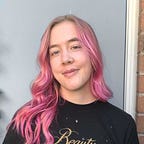Forget Incels, Meet Femcels
In 1993, a Canadian University student known only by her first name, Alana, created a website to discuss her frustration due to her lack of sexual activity with others. The website, titled “Alana’s Involuntary Celibacy Project”, is often cited as the place of origin for the term “incel” (Cotte, 2020). Alanna has since distanced herself from the movement and is disappointed in where the group has gone since her involvement.
The discourse amongst incels tends to be brimming with resentment, misogyny, misanthropy, self-pity and self-loathing. There is also a sense of entitlement to sexual activity from women, and the endorsement of violence against sexually active people.
Today, the incel community has transcended to a global online subculture. In 2018, the incel community began to be considered a terrorist threat, and the Toronto Van attack became the first instance of allegedly incel-related violence to be prosecuted as an act of terrorism.
Meet Femcels
The majority of media attention the incel community attracts focuses on cis-men who are deeply angry about their lack of attention from women. However, a small subset of the incel community are cis-women who describe themselves as “femcels”. Like incels, femcels define themselves as unable to find a romantic or sexual partner despite desiring one. Many think of themselves as the ultimate victims of lookism, “discrimination based on the physical appearance of a person” (Takáč, 2020).
The group has been criticized for being misogynistic, transphobic, and narcissistic due to their viewpoints. Femcels conversate, debate, and confer with one another across multiple social media platforms, particularly Reddit, 4Chan, and independent forums.
The group is highly unconventional as they are women vocalizing thoughts that ordinarily others deem too embarrassing or shameful to disclose. As a result of the patriarchy, men hold the power in society while women are largely excluded from it. This includes the ability to vocalize one’s thoughts, opinions, or ideas in public spaces with no fear of retribution. Women are often taught to be decorative, not substantive, limiting their inner thoughts to themselves. Whereas femcels have no issue being staunch, opinionated, and repugnant, for better or worse.
Femcels are considered to be a subculture as they believe in dominant cultural feminine beauty ideals and heteronormative dating norms, but for a variety of reasons, feel they have difficulty adhering to them. They exist among the dominant group of people striving to be conventionally pretty but consider themselves to be insufficient in their efforts. They deeply wish to conform to the homogeneous appearance of women represented in cultural products such as advertisements, film, and social media. Femcels wish to engage in romantic encounters or sexual activity. Rarely do femcels choose to operate against cultural norms, values, or beliefs. They compare themselves to dominant cultural ideology and their struggle to adhere to these standards upsets them so much they rely upon one another for validation.
Exchanges between members happen on social media platforms such as the website Crystal Cafe, an anonymous imageboard popular amongst femcels. A recent post asks users “when did you discover that you were unattractive?”, exemplifying their interest in ruminating on their perceived shortcomings for how conventionally unattractive they are. The image the user has selected to accompany the question likely symbolizes herself, someone seemly upset while displaying a dishevelled and slovenly appearance. Many users responded with stories of romantic rejection, adverse childhood experiences, and instances of what they believe to be discrimination based on appearance.
Why femcels communities exist, according to users
An affordance of femcel communication is anonymity. As previously mentioned, femcels often vent to each other about their frustrations relating to dating and sex using online forums. Many claim that these anonymous communications act as a cathartic experience. They are display vulnerability with little fear of social rejection as their identity is secret. Most other users respond with similar anecdotes or messages of solidarity, meaning the poster rarely faces judgment for how legitimate their point of view is. The presence of anonymity provides users with a safe space to unload all of their intrusive, distressing, or upsetting thoughts.
The Consequences of Being a Femcel
Perhaps the most important affordance of femcel communication is the moderation and censorship of information leading to an echo chamber effect. Like many online forums and imageboards with debate and community formation, moderation is a crucial structural feature of femcel communication (Graham & Wright, 2014). Moderates are individuals meant to oversee posts to ensure they align with any rules, guidelines, or expectations users are meant to follow. Within femcel communication, the moderators often use their power unjustly to censor those presenting credible information that disproves or counteracts aspects of femcel ideology. This type of behaviour by moderators means that users are experiencing that of an echo chamber, “referring to the situation in which one’s beliefs are reinforced due to repeated interactions with individuals sharing the same points of view” (Garimella, Morales, Gionis, & Mathioudakis, 2018). This is concerning as users are being withheld credible information that could prevent them from continuing to believe in harmful fallacies.
In conclusion, the femcel subculture is a complicated and multifaceted group that calls attention to many larger sociological issues. My hope is that anyone in this community can gain the knowledge, information, and confidence to leave it behind.
References
Cottee, S. (2020). Incel (E)motives: Resentment, shame and revenge. Studies in Conflict and Terrorism,
44(2), 93–114. https://doi.org/10.1080/1057610X.2020.1822589
Garimella K, De Francisci Morales G, Gionis A, Mathioudakis M (2018) Political discourse on social
media: echo chambers, gatekeepers, and the price of bipartisanship. In: Proceedings of the 2018 World Wide Web Conference, WWW ’18, Republic and Canton of Geneva, Switzerland. International World Wide Web Conferences steering committee, pp 913–922.
Graham, T., & Wright, S. (2014). Discursive equality and everyday talk online: The impact of
“super-participants”. Journal of Computer-Mediated Communication, 19 (3), 625–642.
Takáč, P. (2020). Current issues in aesthetics and beyond: Revisiting lookism. Ethics & Bioethics (in
Central Europe), 10(1), 59–68. https://doi.org/10.2478/ebce-2020-0005
